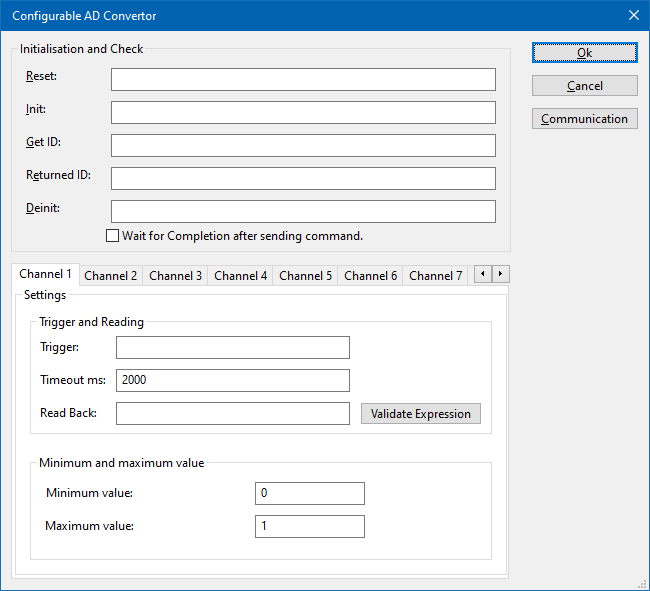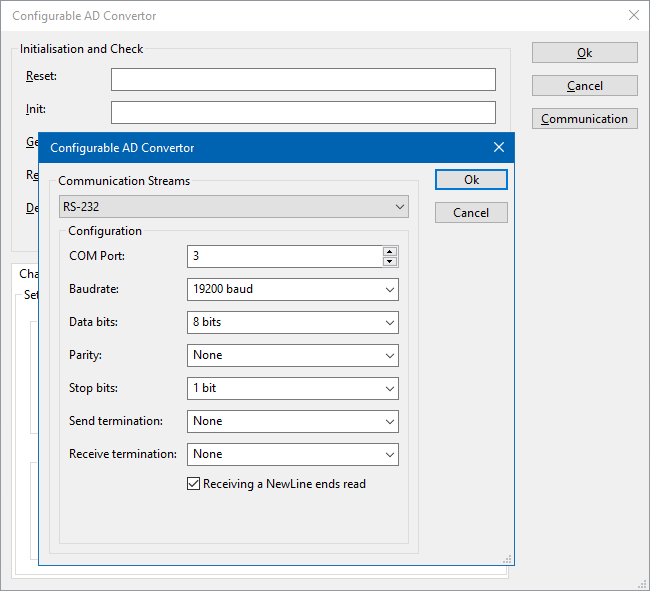Configurable AD Convertor: Difference between revisions
No edit summary |
No edit summary |
||
| Line 10: | Line 10: | ||
[[Image:Configurable AD Converter Configuration Window.png]] | [[Image:Configurable AD Converter Configuration Window.png]] | ||
== Communication == | == Communication == | ||
| Line 40: | Line 39: | ||
A good regular expression for finding the first number in scientific notation in a text is: | A good regular expression for finding the first number in scientific notation in a text is: | ||
'''([+-]?[0-9]*\.?[0-9]+([eE][+-]?[0-9]+)?)''' | |||
For more possibilities see the example section. | For more possibilities see the example section. | ||
| Line 52: | Line 51: | ||
{{ScreenElementDescriptionStart}} | {{ScreenElementDescriptionStart}} | ||
{{ScreenElementDescription|Minimum value|The lowest value that can be measured with this device. The value must be the same as filled in the [[EUT]] window.}} | {{ScreenElementDescription|Minimum value|The lowest value that can be measured with this device. The value must be the same as filled in the [[EUT]] window.}} | ||
{{ScreenElementDescription|Maximum value|The highest value that can be measured with this device. The value must be the same as filled in the [[EUT]] window.}} | {{ScreenElementDescription|Maximum value|The highest value that can be measured with this device. The value must be the same as filled in the [[EUT]] window.}} | ||
{{ScreenElementDescriptionEnd}} | {{ScreenElementDescriptionEnd}} | ||
Revision as of 12:21, 18 September 2017
The Configurable AD Convertor device driver is a AD Converter which is supported by RadiMation®. It can be used to control other measurement equipment, for which no RadiMation device driver is available yet. The Configurable AD Convertor allows to retrieve a measurement value from the measurement equipment, where the measured value can then be used in RadiMation as an EUT Monitoring input. These values can thus be measured and shown in graphs during immunity tests.
Communication[edit]
Multiple communication types can be selected for the configurable AD convertor. Depending on the connection that is used, select the correct Communication Stream, and configure the parameters correspondingly.
Initialisation and Check[edit]
| The reset code that needs to be send to device. When left blank, no command will be send. |
| The command that is send to initialize the configured device. When left blank no command will be send. |
| The command that is send to retrieve the ID of the device. This is used to check if the device is connected. A commonly used SCPI command is: *IDN?. When left blank, no command will be send. |
| The identifier is used to check if the correct device driver is selected and the device is connected. Leaving this blank, will skip the device check. |
| Specifies the command that is send when the device is no longer controlled. This can for example be used to put the measurement device is an intrinsic safe state. Leaving this blank, will keep the device in its last state after controlling it. |
| The checkmark can be enabled so RadiMation® will wait for all the commands to complete, before it continues. This is done by sending SCPI command *OPC? to the device. |
Channels[edit]
AD convertors can have multiple channels on which AD values could be read. For each AD channel, individual commands can be set.
Trigger and Reading[edit]
| A trigger command can be specified to request a measurement from the device. A commonly used SCPI command is: *TRG. When left blank, no command will be send. |
| Different measurement devices will return different messages that contain the measurement value. The configurable AD convertor only need the numeric value of the measurement devoce response. The text that is specified in the Read Back box, is used as a regular expressions to determine the returned value.
A good regular expression for finding the first number in scientific notation in a text is: ([+-]?[0-9]*\.?[0-9]+([eE][+-]?[0-9]+)?) For more possibilities see the example section. |
| Shows a window where the expected output of the measurement device and a regular expression can be typed. The result of the interpretion will then automatically be shown. This window can be used to test the regular expression, to determine if the expected response results in the desired value. |
Minimum and maximum value[edit]
The minimum and maximum must be set to calculate the raw AD convertor value to a digital value with a specific type.
| The lowest value that can be measured with this device. The value must be the same as filled in the EUT window. |
| The highest value that can be measured with this device. The value must be the same as filled in the EUT window. |
With minimum set to 0 and maximum set to 1, the raw value won't be converted, but instead directly used as it is included in the response.
Read Back examples[edit]
Received information
|
Regex
|
RadiMation Readout
|
Note
|
|---|---|---|---|
| U_L_N 325 | (-?[0-9.,Ee-]+)
|
325
|
Takes the first number.
|
| I_L1;12.34 | ;(-?[0-9.,Ee-]+)
|
12.34
|
Takes the first number after ";".
|
| THD_U_L1;;14,5 | ;;(-?[0-9.,Ee-]+)
|
14.5
|
Takes the first number after ";;".
|
| AC_FREQ;Channel1;1.23E3 | ;.*;(-?[0-9.,Ee-]+)
|
1230
|
Takes the first number after the appearance of a second ";".
|
The regular expression can always be tested trough the Validate Expression function.

